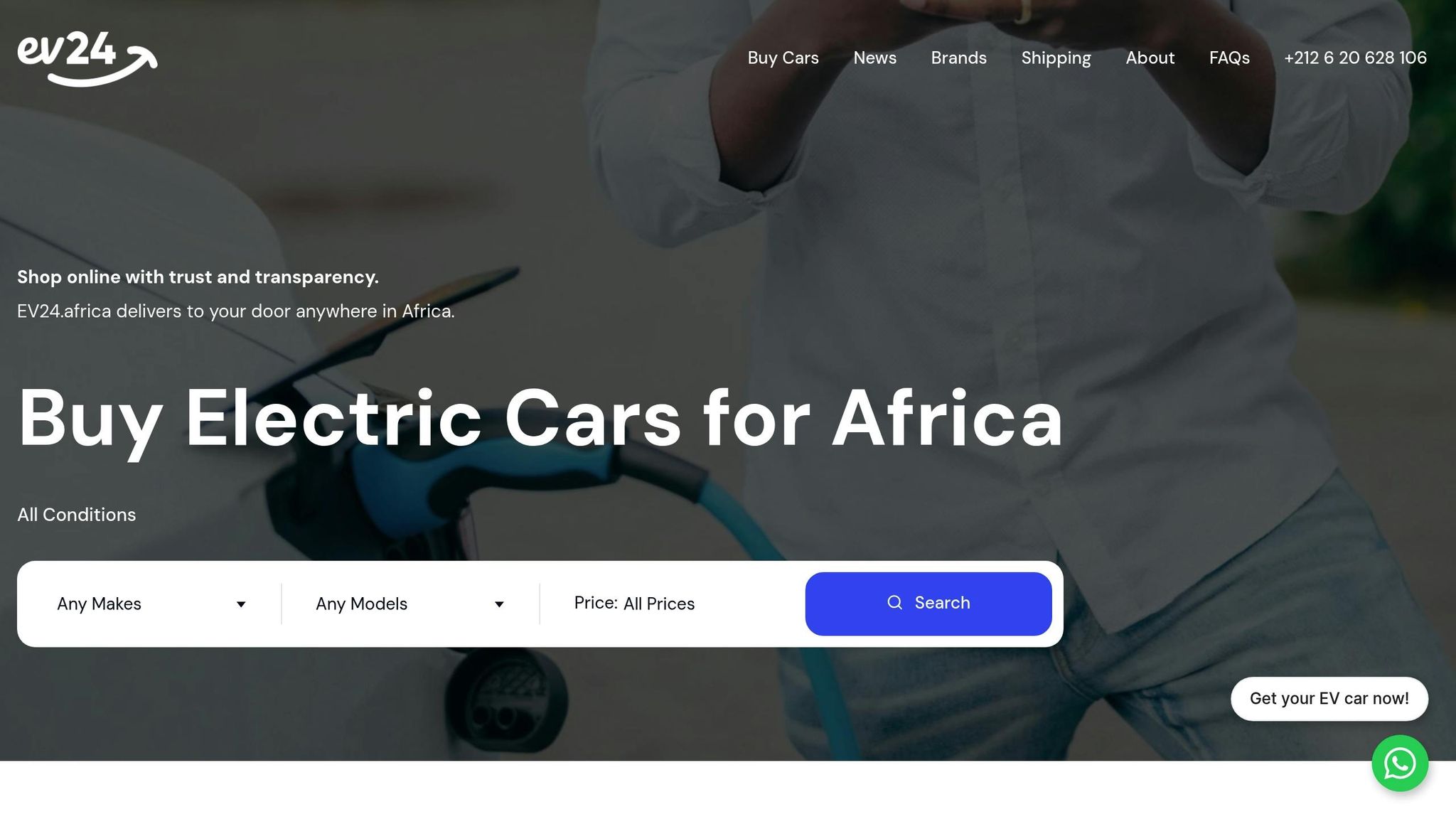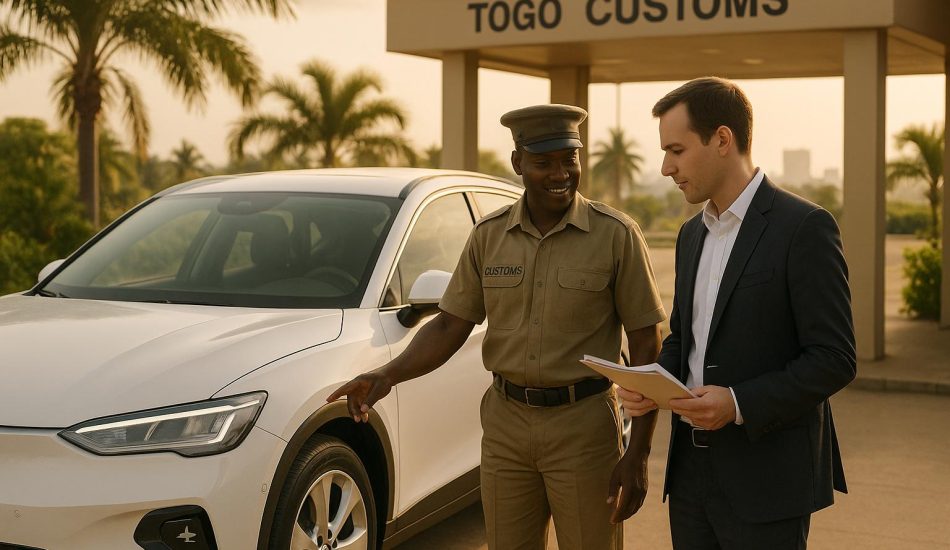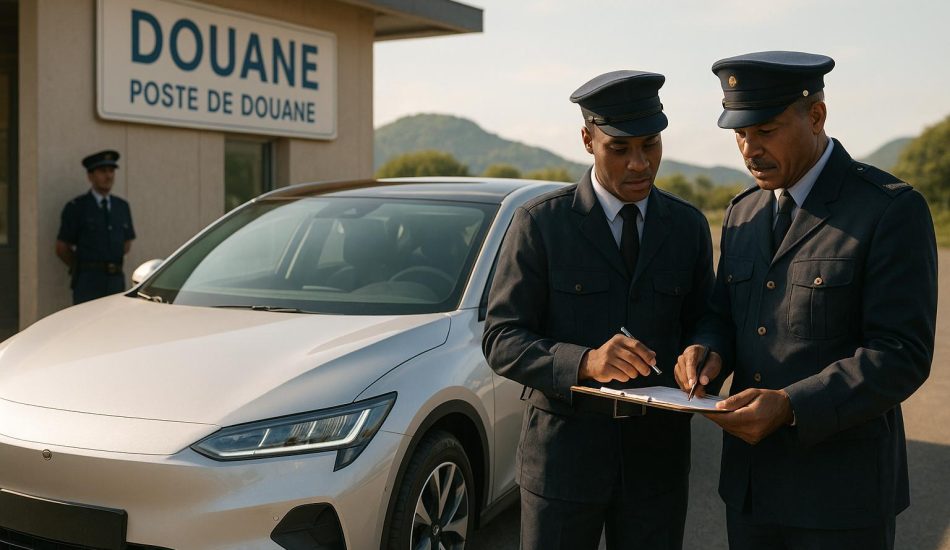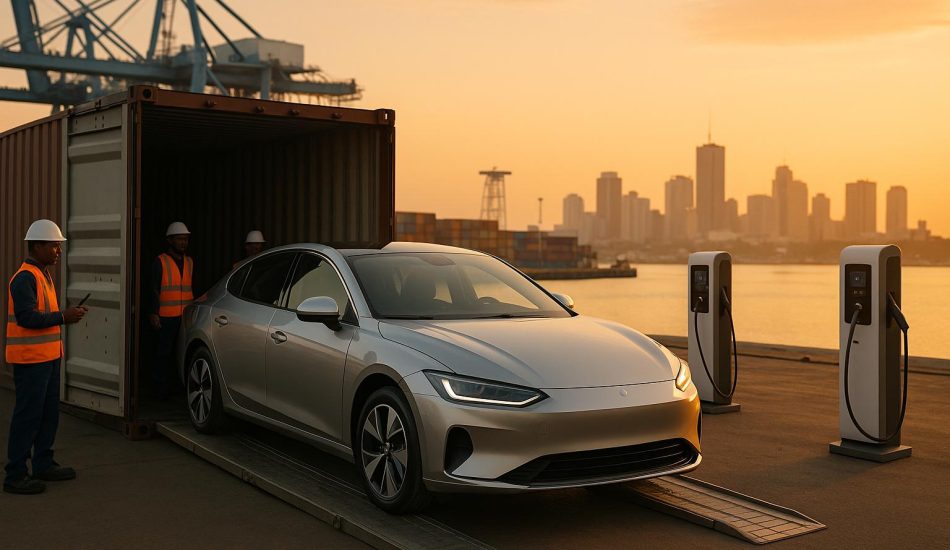
In 2025, Burkina Faso introduced updated rules for importing electric vehicles (EVs) to promote cleaner transportation and reduce fuel reliance. Here’s what you need to know:
- Key Agencies: The Ministry of Commerce oversees import authorizations, while COTECNA handles pre-shipment inspections for vehicles worth over $1,565. ARCEP ensures EVs with wireless systems meet local communication standards.
- Import Costs: Customs duties include a 10% import duty and a 12.5% VAT. Additional fees, such as a $275 cargo tracking note and local charges, may apply. Older vehicles (over 10 years) incur higher taxes.
- Required Documents: You’ll need the original state title, bill of sale, vehicle specs, and an Electronic Cargo Tracking Note (ECTN), among others.
- Shipping Routes: Most EVs are shipped to Ghana’s Port of Tema before overland transport to Burkina Faso. The Port of Ouagadougou is the main destination for vehicle imports.
- Safety and Technical Standards: EVs must meet strict safety checks, including battery system integrity, and comply with technical requirements like VIN and propulsion system identification.
Pro Tip: Work with experienced shipping companies and customs brokers to avoid delays and ensure compliance with regulations.
Burkina Faso is also exploring tax incentives and infrastructure investments to make EV adoption more affordable. With the right preparation, importing an EV can be a smooth process.
How to Import EVs into Burkina Faso: Step-by-Step Guide
Bringing an electric vehicle (EV) into Burkina Faso involves a series of well-defined steps. From choosing the right EV to handling customs clearance, knowing what to expect can save you time and avoid extra costs along the way.
Buying Your EV and Preparing for Import
Start by ensuring your chosen EV meets Burkina Faso’s import rules. Research reliable shipping companies that specialize in transporting vehicles from the U.S. to Burkina Faso. Their experience with local regulations can be a big advantage.
It’s important to note that vehicles older than 10 years come with higher taxes and duties. When arranging shipping, you’ll need to provide detailed information about your EV, including its year, make, model, VIN, weight, and dimensions.
Make sure you have the original state title, a lien release (if applicable), and a bill of sale showing a $0.00 balance. You’ll also need to provide your shipping details, such as your name or company information, full address, phone number, and either your EIN, Tax ID, or foreign passport ID. For the receiving party in Burkina Faso, include their name, local address, and contact number.
Once your documents are in order, you’ll be ready to move on to the customs process.
Customs Process and Required Documents
To clear customs, you’ll need to provide a set of mandatory documents. One essential requirement is the Electronic Cargo Tracking Note (ECTN), also known as the Bordereau de Suivi Cargaison (BSC). This document is required for all cargo shipments and costs $275 per vehicle.
The shipping method you choose – whether it’s Roll-On/Roll-Off (RORO), container shipping, shared container services, or air cargo – will dictate the specific transport document needed. Options include the original shipping bill of lading, seaway bill, or airway bill.
Here’s a quick overview of the key documents required:
| Document | Purpose |
|---|---|
| Original state title | Confirms legal ownership and includes seller/buyer details |
| Bill of sale/commercial invoice | Details the transaction and shows a $0.00 balance |
| ECTN (Cargo Tracking Note) | Tracks shipments to Burkina Faso |
| Vehicle specs sheet | Lists details like year, make, model, VIN, weight, and dimensions |
| Combined Certificate of Value and Origin (CCVO) | Confirms the vehicle’s origin and declared value |
For vehicles valued over FCFA 1,000,000 (roughly $1,565), a pre-shipment inspection is mandatory to ensure safety and technical compliance before the vehicle departs.
Most EVs are shipped to the Port of Tema in Ghana, followed by overland transport to Burkina Faso. Within Burkina Faso, the Port of Ouagadougou is considered the most efficient destination for vehicle imports. Your clearing agent or broker will handle customs procedures upon arrival, so it’s crucial to work with them early and provide the necessary documents, such as the release or bill of lading, as soon as they’re available.
Customs duties typically include a 10% import duty and a 12.5% VAT. Additionally, local costs – covering port handling, documentation, and delivery – can range from $1,500 to $2,500.
How Long Each Step Takes
The time required for the entire process depends on how quickly you can prepare your documents and the shipping method you choose. Different transport options have varying transit times, but prompt submission of paperwork and efficient coordination with shipping companies and clearing agents can significantly speed things up.
Working with professionals familiar with Burkina Faso’s import procedures can help ensure a smoother process and reduce the likelihood of delays.
Technical and Safety Rules for Imported EVs
Bringing electric vehicles (EVs) into Burkina Faso comes with a set of technical and safety requirements. These rules aim to protect consumers, ensure vehicles meet local standards, and align with the nation’s push toward cleaner transportation options.
Technical Rules for EVs
Imported EVs must include clear identification of their propulsion system. This means the vehicle’s front windshield should display its VIN, which must specify the propulsion type – whether it’s fully electric, hybrid, plug-in hybrid, or powered by CNG or LNG. Additionally, the Material Safety Data Sheet (MSDS) for the car battery must be provided, and both the shipping company and Customs in Burkina Faso need to be informed about the incoming EV.
In February 2025, Burkina Faso introduced its first locally manufactured electric car, the ITAOUA, built in Ouaga 2000. This EV boasts a range of 330 kilometers per charge and includes fast-charging technology capable of fully recharging the battery in just 30 minutes.
"The ITAOUA electric vehicle is designed to provide a sustainable mobility solution, reducing dependence on fossil fuels while promoting clean energy alternatives in Africa." – Manufacturer of ITAOUA EV
Safety Checks and Limits
Meeting technical standards is only part of the process. EVs must also pass strict safety checks. Before shipping, ensure the car’s battery system is intact and free from damage or leaks. Many shipping companies require confirmation that the battery is undamaged, as some may refuse to transport electric or hybrid vehicles due to safety concerns during international shipping.
New vs. Used EV Requirements
Regulations for new and used EVs differ slightly. While specific technical distinctions between the two are not detailed in current policies, all imports require authorization from the Ministry of Commerce, Industry, and Handicrafts. This import permit is valid for six months, so timing is critical when planning shipments.
Import Costs: Taxes, Duties, and Fees
Planning to import an EV into Burkina Faso in 2025? Understanding the financial landscape is key. This section breaks down the essential costs you’ll face, from taxes to duties, so you can budget effectively. Burkina Faso’s membership in the West African Economic and Monetary Union (WAEMU) and the Economic Community of West African States (ECOWAS) influences its import tariffs. These unions use a Common External Tariff (CET) system, applying uniform rates on goods brought in from outside their member states.
Tax and Duty Breakdown
The CET system ensures a standardized approach to import duties, but the actual rates depend on the type of product being imported. For EVs, the main cost components include CET duties, the AES levy, and inspection fees.
One recent addition is the 0.5% AES import levy, introduced by the Alliance of Sahel States (AES), which includes Burkina Faso, Mali, and Niger. This levy applies to all goods entering the bloc from non-member countries and helps fund alliance operations. However, exemptions exist for items like humanitarian aid, diplomatic goods, and trade between member nations.
The Burkinabé government is also exploring policies to encourage EV adoption, such as tax breaks and investments in charging infrastructure. While these measures haven’t been fully implemented yet, they hint at potential future cost reductions for EV imports. It’s also worth noting that duties can vary based on a vehicle’s age and type.
How Vehicle Age and Type Change Costs
The age of the vehicle plays a big role in determining import costs. Across Africa, including Burkina Faso, used vehicles dominate the roads, accounting for at least 95% of all vehicles in countries like Burkina Faso, Cameroon, Niger, Sierra Leone, and Uganda. However, many countries in the region impose restrictions on older vehicles. For instance, about 25 African nations have maximum age limits for imported vehicles, with 10 of them outright banning vehicles older than five years. While Burkina Faso’s specific rules aren’t fully detailed, older vehicles often incur higher duties and additional taxes compared to newer ones.
The type of EV you plan to import also impacts costs. Passenger vehicles and commercial vehicles are taxed differently, and commercial EVs may have unique duty structures compared to those intended for personal use. This distinction is crucial when deciding which EV category suits your needs.
Sample Cost Example
To give you a clearer picture, here’s a breakdown of costs for importing a mid-range EV valued at $25,000 USD:
- Base vehicle cost: $25,000.00
- CET import duty: Depends on the vehicle’s classification
- AES import levy (0.5%): $125.00
- Pre-shipment inspection fee: Required for imports exceeding 1,000,000 CFA francs (about $1,565 USD)
- Additional processing fees: Variable
Using Delivered Duty Paid (DDP) Incoterms can simplify the process by consolidating all costs and procedures with the seller.
Shipping logistics also play a role in the total cost. EV24.africa, for instance, routes vehicles through Ghana’s Port of Tema, followed by overland transport to Burkina Faso. While this affects shipping expenses, it ensures reliable handling for EVs.
Considering Burkina Faso’s per capita income of about $850 USD (2023), importing an EV is a significant financial commitment for most residents. Still, the government’s push for cleaner transportation and the possibility of future incentives could make EVs a more viable option for those who can manage the upfront costs.
sbb-itb-99e19e3
Tips for Easy EV Import Process
After understanding the procedures and costs involved, these tips provide practical advice to make your EV import journey smoother. The secret lies in being well-prepared, partnering with experienced professionals, and using platforms that offer localized expertise to navigate the 2025 regulations effectively.
Finding Reliable Shipping and Customs Partners
The right shipping and customs partners can make all the difference. Look for companies with a proven track record, clear communication, and the proper credentials to handle the complexities of documentation and customs procedures. It’s essential to choose partners who are familiar with the varying customs clearance processes and fee structures across African countries. Their expertise can guide you through each step, ensuring the process is as seamless as possible.
Common EV Import Mistakes to Avoid
Avoiding common pitfalls can save you both time and money. Start by ensuring all registration certificates and paperwork are accurate – errors here can lead to unexpected tax charges. Don’t skip a thorough physical inspection of the vehicle; overlooking its actual condition could result in misclassification and hefty penalties. Confirm that your EV complies with all technical and safety standards before shipping. Working with manufacturers or dealers who specialize in exporting vehicles that meet local requirements can save you from costly modifications after import. Be mindful of additional fees beyond the vehicle’s base price, as they can quickly strain your budget. Consistent communication with customs officials and your shipping partners is also vital to avoid unnecessary delays.
For a smoother process, consider services tailored to simplify EV imports.
Using EV24.africa for Easier Imports

EV24.africa is a platform designed to simplify the entire EV import process, from sourcing to delivery. They offer a wide range of EVs from Europe, Asia, North America, and Japan, including well-known brands like Tesla, BYD, and Volkswagen. With a strong local presence, EV24.africa stays up to date with regulatory changes and understands the specific needs of African buyers.
The platform takes care of the entire import process, using customized Incoterms to handle customs clearance, registration, and compliance with local taxes. Their efficient logistics network, centered around the Port of Tema in Ghana, ensures reliable delivery, whether you choose door-to-door or port-to-port services. Additionally, EV24.africa provides financing options and transparent pricing, helping you plan your budget with ease. By integrating these services with the outlined import requirements and cost-saving strategies, EV24.africa offers a hassle-free way to import your EV.
Following these tips and leveraging trusted services can help you avoid the common challenges associated with EV imports, ensuring a smoother and more efficient experience.
Key Points for EV Imports in 2025
Bringing an electric vehicle (EV) into Burkina Faso in 2025 requires careful attention to regulations, financial planning, and professional assistance. As a member of the West African Economic and Monetary Union (WAEMU), Burkina Faso applies a shared five-band Common External Tariff ranging from 0% to 35%. This unified system provides a level of predictability in tariff rates.
The import process heavily relies on proper documentation and obtaining necessary authorizations. Missing or incomplete paperwork can result in costly delays and unexpected fees at customs.
Budgeting is another critical step, especially considering how tariff changes in other regions have led to vehicle price hikes of $3,000 to $10,000. With Burkina Faso’s average tariff for non-agricultural goods at 11.5% as of 2016, understanding all associated costs is essential to avoid financial surprises. Given these complexities, having a clear grasp of WAEMU’s regulations and fee structures is crucial.
WAEMU’s customs processes and technical compliance standards can be challenging to navigate. This is where EV24.africa steps in. With a team of over 200 professionals spread across five African nations and partnerships in more than 40 countries, they simplify the entire process. From sourcing your EV to handling customs clearance, registration, and import tax compliance, EV24.africa ensures your vehicle meets all local requirements. By adhering to international commercial terms (Incoterms), they take the uncertainty out of the import process, reducing risks and potential setbacks.
"At EV24.africa, customer satisfaction is our top priority."
Successfully importing an EV in 2025 will depend on thorough preparation, accurate budgeting, and reliable expertise. With the right support, the new regulations present exciting opportunities for EV adoption in Burkina Faso.
FAQs
What are the key advantages of importing an electric vehicle to Burkina Faso under the 2025 regulations?
2025 Regulations for Importing Electric Vehicles to Burkina Faso
The 2025 regulations for bringing electric vehicles (EVs) into Burkina Faso come with several practical advantages. For starters, EVs are known for their lower operating costs. They’re easier on your wallet when it comes to fuel and maintenance compared to traditional gas-powered cars. Plus, they produce zero tailpipe emissions, which means cleaner air and a smaller impact on the planet.
These new rules are part of Burkina Faso’s broader push to encourage cleaner transportation options and reduce greenhouse gas emissions. By opting for an EV, you’re not just saving money – you’re also contributing to a healthier environment and embracing cutting-edge, eco-conscious technology.
How do Burkina Faso’s import taxes for electric vehicles compare to other West African countries?
Starting in early 2025, Burkina Faso will impose a 40% import duty on electric vehicles (EVs), along with a 0.5% levy on imported goods to fund regional projects. This approach stands in contrast to neighboring Liberia, where EVs are completely exempt from import taxes, including duties and VAT. On the other hand, Niger applies import duties ranging from 10% to 20%, along with similar regional levies.
Burkina Faso’s EV import taxes are noticeably higher than Liberia’s but are comparable to or slightly lower than those in Niger. Buyers should factor in the additional regional levies when estimating the total cost of importing EVs.
What technical and safety standards must electric vehicles meet to be imported into Burkina Faso in 2025?
To bring an electric vehicle into Burkina Faso in 2025, it needs to meet international safety standards, including UN 38.3, which ensures the battery is safe during transport. On top of that, the vehicle must adhere to local rules regarding thermal management, battery certification, and overall vehicle safety protocols. These requirements are in place to ensure the safe integration of EVs and align with global practices.
Be sure the EV comes with all necessary documentation proving compliance with these standards to prevent any delays or complications during the import process.




